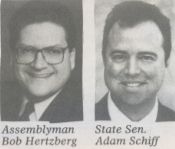| When Gov. Pete Wilson left office, some declared any serious effort to
reform the State Bar dead on arrival. Without a harsh critic holding lawmakers' feet to
the fire, they claimed, this year's debate over bar legislation would begin and end with a
discussion of how much members should pay in annual dues. Steps proposed last year to
reform the bar, they were sure, would be quickly forgotten. Our measure, Senate Bill 144
- recently signed into law by Gov. Gray Davis - proved these critics wrong.
Not only does the bill provide the bar with the means to carry out its core consumer
protection functions, it also enacts significant structural reforms to the bar itself.
These provisions will make the organization more accountable both to the legal community
and to the public at large.
Among them:
 Dues Reform. Our bill reduces
annual dues to $395 - approximately 20 percent below the level set by law before former
Gov. Wilson's veto. In addition, attorneys earning less than $40,000 a year will pay 25
percent less. Those making less than $25,000 will receive a 50 percent dues discount. Dues Reform. Our bill reduces
annual dues to $395 - approximately 20 percent below the level set by law before former
Gov. Wilson's veto. In addition, attorneys earning less than $40,000 a year will pay 25
percent less. Those making less than $25,000 will receive a 50 percent dues discount.
  Conference of
Delegates Reform. The legislation specifically states that mandatory dues should
not be used to support the activities of the Conference of Delegates and the State Bar
sections. Conference of
Delegates Reform. The legislation specifically states that mandatory dues should
not be used to support the activities of the Conference of Delegates and the State Bar
sections.
 Lobbying Reform. The measure
establishes a prospective deduction system that allows members to reduce their dues by $5
if they do not wish to support lobbying efforts not directly related to the practice of
law. Lobbying Reform. The measure
establishes a prospective deduction system that allows members to reduce their dues by $5
if they do not wish to support lobbying efforts not directly related to the practice of
law.
 Fiscal Reform. The bill requires
an annual fiscal audit of the bar, as well as a performance audit every two years. Fiscal Reform. The bill requires
an annual fiscal audit of the bar, as well as a performance audit every two years.
 Continuing Education Reform. SB
144 reduces mandatory continuing legal education (MCLE) requirements to 25 hours every
three years and requires the bar to offer low-cost programs and materials to members. Continuing Education Reform. SB
144 reduces mandatory continuing legal education (MCLE) requirements to 25 hours every
three years and requires the bar to offer low-cost programs and materials to members.
For those who followed last year's debate over the State Bar, several of these reforms
should have a familiar ring. Indeed, provisions to reduce dues, provide independent
funding of the Confer-ence of Delegates and reform the bar's fiscal operations were all
incorporated into the legislation Assemblymember Hertzberg proposed last year.
To be sure, there are significant differences between this year's legislation and the
demands made last year by the bar's harshest critics.
Just as we did last year, we again rejected calls to cut dues below the level needed to
fund the bar's consumer protection programs. We again refused to impose unconscionable
restrictions on legal services programs funded by interest on trust accounts.
There was another important contrast between the debate this year and last: This year,
we managed to sidestep the political gamesmanship that last year left consumers and bar
employees in the lurch.
Instead, the debate focused on sound policy meant to put the bar on a sound financial
footing, restore the confidence of consumers and enact meaningful reform. We accomplished
those goals with SB 144.
We would be asking too much to expect the sound-bite cynics to eat their words.
Instead, we'll gladly settle for something far more important: results.
 Assemblymember Robert Hertzberg of Van Nuys
and state Sen. Adam Schiff of Pasadena carried the State Bar's fee bill. Assemblymember Robert Hertzberg of Van Nuys
and state Sen. Adam Schiff of Pasadena carried the State Bar's fee bill.
|

